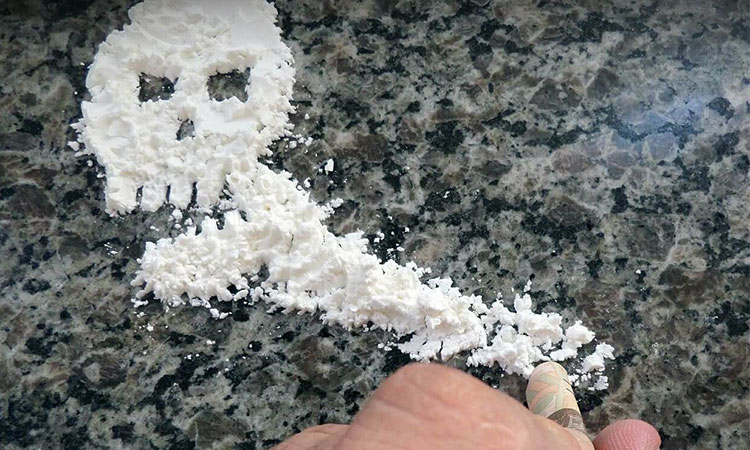
How long does cocaine stay in your system? Cocaine can remain in the human body anywhere from 3-6 hours after the last dose is taken. Also, cocaine use produces a metabolite known as benzoylecgonine (BE), which can take up to two days to be fully eliminated from the body.
Research has shown that when a person uses cocaine, around 40 percent undergoes hydrolysis (merges with water) to produce benzoylecgonine. Another 40 percent is processed by the liver. Cocaine itself has a short half-life of about an hour, but the BE has a half-life of approximately six hours.
Factors That Effect How Long Cocaine Remains in the Body:
The higher the dose, the longer it takes to be completely expelled from the body. The manner in which the drug is delivered is also a factor.
Injecting cocaine will result in a fast, more intense high, but it also leaves the body more rapidly (the half-life is about five minutes, and clears the system in around 30.)
Snorting cocaine usually results in a high that persists for 10-30 minutes, taking no more than three hours to be fully expelled.
Smoking freebase cocaine, as opposed to other methods, extends the half-life to about 45 minutes and can take up to four hours for the drug to be cleared.
Oral ingestion can delay the high for an hour or so, and effects can last for two more hours after. Half-life is about an hour, and it may over five hours for the drug to be entirely expelled.
Long-term cocaine users may have a tendency to retain cocaine in their bodies for an extended period, initiating storage in fatty tissues. For this reason, detox can take longer and symptoms are often more severe.
Moreover, the longer the duration of cocaine use, the more difficult it is for their body to expel it – in essence, the body’s elimination process becomes less efficient over time and eventually loses functionality.
Purity level is also a factor – the purer the cocaine, the more potent the effects and the longer it will remain in a person’s system. A number of other determinants include, but are not limited to the following: metabolism, body mass, age, and pre-existing health conditions.
A Word About Drug Tests
Drug tests do not actually determine how long cocaine remains in a person’s system, but rather, toxicological methods may identify traces of cocaine use, in some cases, for up to three months.
For example, a blood test can detect cocaine in the human body for the first 24 hours, whereas a urine test can detect cocaine in the body from 2-30 days. Hair follicles can hold traces of cocaine use for up to three months.
Cocaine Excretion
Some research has found that the amount of the drug used can also be a determinant in how long cocaine metabolites (BE) persist in a user’s system. Other factors that can hinder the release of BE include:
- Alcohol consumption
- Being overweight/obese
- Inactivity/sedentary lifestyle
- Lack of hydration
- Caffeine overuse
Cocaine Intoxication

Retention of cocaine in the human body leads to cocaine intoxication, a condition that can result in adverse side effects in addition to the desired effects such as euphoria.
Cocaine use is deceptive, and users can still suffer from an overdose even after many of the effects seem to have worn off. Users often take successive doses mistakenly believing that because effects have abated that they are safe to use again.
Using consecutive doses of cocaine, however, puts the user at a heightened risk for overdose as the drug continues to build up in the system with each additional use.
Using an excessive amount of cocaine or taking it in a high concentration can produce the following adverse symptoms:
- Anxiety and agitation
- Chest pain/pressure
- Elevated heart rate, blood pressure, and body temperature
- Sweating
- Nausea
- Tremors
- Confusion
- Hyperactivity
An overdose can also result in muscle damage, kidney damage, brain hemorrhage, stroke, or respiratory failure, and sudden death due to organ failure.
If you or someone you know has recently used cocaine and appears experiencing any of the following symptoms, please call 911 immediately:
- Dangerously high blood pressure
- Irregular heart rate
- Extremely high body temperature
- Extreme anxiety or confusion
- Psychosis
- Seizures
- Irregular heartbeat (arrhythmia)
Mental Health Conditions
In addition to anxiety, high doses of cocaine can lead to other serious symptoms of mental illness, including depression/suicidal thoughts, mania, paranoia, and psychosis. Occasionally, psychiatric symptoms can arise in those engaging in much lower levels of cocaine use.
Street cocaine is often laced with other potentially life-threatening substances which can contribute to their own set of symptoms and unpredictable effects.
Takeaways: Individual factors and the properties of the cocaine being used help determine how long it will stay in the system. Any cocaine use in of itself is risky, but using several doses of cocaine in succession is especially dangerous because of continually rising levels of the drug.
Getting More Information
We provide a comprehensive, holistic method to treatment, encompassing a wide array of different evidence-based practices in combination. All of Midwood Addiction Treatment’s primary therapists are either licensed or master’s level clinicians.
Our programs are structured with various components of evidence-based treatment practices and holistic approaches to treatment that provide our patients with the knowledge and tools they need to be successful in their recovery.
If you or your loved one is suffering from substance abuse, please seek help as soon as possible.